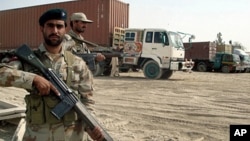Secretary of State Hillary Clinton said Tuesday that Pakistan will reopen key NATO supply routes into Afghanistan, after having closed them in response to a deadly NATO airstrike last year. The development comes months after Pakistan demanded that the United States apologize for the incident.
Clinton says she spoke by telephone with Pakistani Foreign Minister Hina Rabbani Khar and again expressed "deepest regrets" for the airstrike that killed 24 Pakistani troops in November.
In a statement, Clinton said Khar advised her that vital supply routes to Afghanistan, formally known as the "ground lines of communication," or GLOC, will be reopening. She said no lethal equipment will transit into Afghanistan, unless it is to equip Afghan National Security Forces.
State Department spokeswoman Victoria Nuland told reporters that Clinton's statement makes clear that mistakes made on both sides led to the tragic accident last year.
"There was an investigation," said nuland. "There was a U.S. investigation; there was a Pakistani investigation. We have all the way through this expressed our regret for the loss of life."
U.S. Defense Secretary Leon Panetta welcomed the reopening of the supply routes, as did the commander of NATO forces in Afghanistan, U.S. Marine Corps General John Allen.
NATO has had to rely on the more costly Central Asian routes to Afghanistan since the closure of the Pakistani routes. Defense Department officials say that amounts to an additional $100 million each month to transport supplies.
The State Department's Victoria Nuland says there will be no additional fees paid to Pakistan for use of the supply routes, or GLOCs. But she noted that there are regular commercial costs associated with transporting supplies through Pakistan.
"Let me start by saying that the secretary of defense has spoken to the fact that it was expensive for us during the period when the GLOCs were closed," she said. "One of the things that has resulted from this is that we have restored the GLOCs, and we are going to be paying the exact same amount as we were paying before. So we are back to significant savings here."
U.S.-Pakistan relations have been strained in recent months. Security analyst Anthony Cordesman at the Washington-based Center for Strategic and International Studies says it is unclear how long this improvement in relations will last.
"It hasn't changed Pakistan's basic political positions," said Cordesman. "It hasn't meant they're going to attack the Taliban or the Haqqani network sanctuaries in Pakistan. Recent polls indicate that Pakistani public opinion is now even more anti-American than in the past, so there is a risk and a sacrifice for the Pakistani government."
Cordesman says it is important for the United States to get the supply routes through Pakistan open because they will be essential to the planned U.S. troop withdrawal from Afghanistan by 2014.
Clinton says she spoke by telephone with Pakistani Foreign Minister Hina Rabbani Khar and again expressed "deepest regrets" for the airstrike that killed 24 Pakistani troops in November.
In a statement, Clinton said Khar advised her that vital supply routes to Afghanistan, formally known as the "ground lines of communication," or GLOC, will be reopening. She said no lethal equipment will transit into Afghanistan, unless it is to equip Afghan National Security Forces.
State Department spokeswoman Victoria Nuland told reporters that Clinton's statement makes clear that mistakes made on both sides led to the tragic accident last year.
"There was an investigation," said nuland. "There was a U.S. investigation; there was a Pakistani investigation. We have all the way through this expressed our regret for the loss of life."
U.S. Defense Secretary Leon Panetta welcomed the reopening of the supply routes, as did the commander of NATO forces in Afghanistan, U.S. Marine Corps General John Allen.
NATO has had to rely on the more costly Central Asian routes to Afghanistan since the closure of the Pakistani routes. Defense Department officials say that amounts to an additional $100 million each month to transport supplies.
The State Department's Victoria Nuland says there will be no additional fees paid to Pakistan for use of the supply routes, or GLOCs. But she noted that there are regular commercial costs associated with transporting supplies through Pakistan.
"Let me start by saying that the secretary of defense has spoken to the fact that it was expensive for us during the period when the GLOCs were closed," she said. "One of the things that has resulted from this is that we have restored the GLOCs, and we are going to be paying the exact same amount as we were paying before. So we are back to significant savings here."
U.S.-Pakistan relations have been strained in recent months. Security analyst Anthony Cordesman at the Washington-based Center for Strategic and International Studies says it is unclear how long this improvement in relations will last.
"It hasn't changed Pakistan's basic political positions," said Cordesman. "It hasn't meant they're going to attack the Taliban or the Haqqani network sanctuaries in Pakistan. Recent polls indicate that Pakistani public opinion is now even more anti-American than in the past, so there is a risk and a sacrifice for the Pakistani government."
Cordesman says it is important for the United States to get the supply routes through Pakistan open because they will be essential to the planned U.S. troop withdrawal from Afghanistan by 2014.




